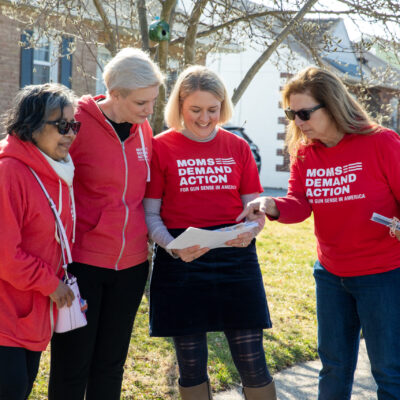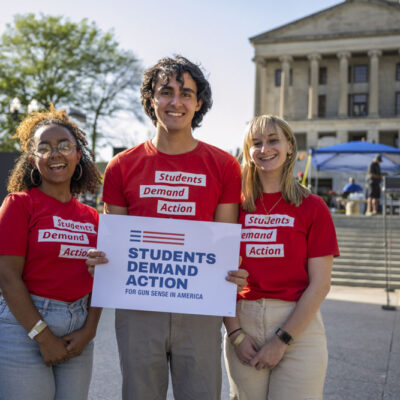New Everytown Analysis: First Half of 2021-2022 School Year Had Most School Gun Violence in Recent History
2.11.2022
Between August 1 and December 31, at Least 136 Instances of Gunfire Occurred on School Grounds, Killing 26 and Wounding 96 — The Most Instances and People Shot in That Five-Month Period Since Everytown Began Tracking in 2013
3 out of 4 School Shooters Acquire the Gun From Their Home; At Least 5.4 Million Children in 2021 Lived in a Home With at Least One Unlocked and Loaded Firearm, Up From 4.6 Million in 2015
Everytown’s Recommendations To Prevent Gunfire on School Grounds Includes Proactive Solutions to Stop Gun Violence Before it Happens By Intervening Early and Keeping Guns Out of the Hands of Prospective Shooters
NEW YORK – A new analysis from Everytown for Gun Safety showed that the first half of the 2021-2022 school year had the most gun violence in recent history. There were 136 instances of gun violence on school grounds – nearly four times the previous average for that period. In the first half of this school year, 96 people were shot and wounded and 26 others were killed – the most people shot in that five-month period since Everytown started tracking gunfire on school grounds (including K-12 schools, colleges, and universities) in 2013.
“Although four years have passed since the day that changed my life, there’s not a moment that goes by that I’m not reminded of what happened,” said Sari Kaufman, a volunteer leader with Students Demand Action and a member of the Everytown Survivor Network who survived the mass shooting at Marjory Stoneman Douglas High School in 2018. “Every shooting, every lockdown, and every news story about a new school shooting opens up wounds from my own experiences. Too often, lawmakers see survivors’ pain and trauma and do nothing. Thoughts, prayers, and social media posts aren’t going to solve the problem – we need action.”
“It’s been a devastating first half of a school year, and without meaningful action from every level of government, more students and teachers will be shot, more communities will be traumatized, and more kids will spend their days worrying about gun violence instead of classes,” said Shannon Watts, founder of Moms Demand Action. “We can’t allow gun violence to continue to take this physical and mental toll on our children.”
Everytown released initial school safety recommendations for the Biden-Harris Administration earlier this school year on a press call with the National Education Association and the American Federation of Teachers. Among the recommendations, which are focused on how the administration can promote secure firearm storage and provide clear guidelines for schools that choose to conduct active shooter drills:
- Direct the Department of Education to develop a strategy to encourage school districts to send parents secure firearm storage information and raise awareness about the importance of secure storage in keeping schools safe.
- Publish guidance on the secure storage information schools should disseminate and on the methods to reach parents, and incorporate the guidance in upcoming convenings, trainings and webinars.
- Develop and provide recommendations on the best type of secure storage devices to prevent unauthorized access by students.
- Direct the Consumer Product Safety Commission to complete the work initiated by the Obama Administration and review the effectiveness of gun locks and gun safes.
- Direct the Department of Justice to enforce the laws that prevent underage students from purchasing firearms and continue to call for Congressional action to close the loopholes in the background check law.
More on secure firearm storage:
Research shows that the best way to protect children and teens from accessing guns is to implement secure firearm storage practices. An estimated 54 percent of gun owners don’t lock all of their guns securely and at least 5.4 million children in 2021 live in a home with at least one unlocked and loaded firearm, up from 4.6 million in 2015. Secure firearm storage in the home is one of the most effective tools to prevent gun violence in schools. According to research from the Department of Homeland Security’s National Threat Assessment Center, up to 80% of school shooters obtain their gun from their home or the home of relatives or friends.
More than 2 million students across the country now live in a school district that requires schools to educate parents about the critical importance of secure firearm storage in keeping schools and students safe, thanks to the advocacy work of volunteers with Moms Demand Action and Students Demand Action. They’ve successfully urged school boards across the country to enact such notification policies, including school districts in Vermont, Texas, California, Arizona, Oregon and Colorado. School districts in Michigan and Maryland also passed notifications after school shootings in Oxford and Montgomery County. Moms Demand Action volunteers around the country have been working to promote secure storage through Everytown’s Be SMART program — a program designed to help parents and other adults normalize conversations about gun safety and take responsible actions that can prevent child gun deaths and injuries, youth suicides, and gunfire on school grounds.
More on active shooter drills:
In December, Humanities and Social Sciences Communications, a peer reviewed journal, published the results of a first-of-its-kind Everytown for Gun Safety Support Fund study on active shooter drills in schools showing that these drills are associated with significant and lasting increases in depression, stress and anxiety, and fear of death among students, parents and teachers. The study, a partnership with Georgia Institute of Technology’s Social Dynamics and Wellbeing Lab, unveils strong evidence on the harmful impacts of active shooter drills.
Using machine-learning technology to analyze nearly 28 million social media posts on Twitter and Reddit in the 90 days before and after local active shooter drills, Georgia Tech and Everytown researchers found that active shooter drills in schools are associated with increases in depression, as evidenced by a statistically significant increase in posts with words like therapy, cope, irritability, suicidal, and more. Read more here.




